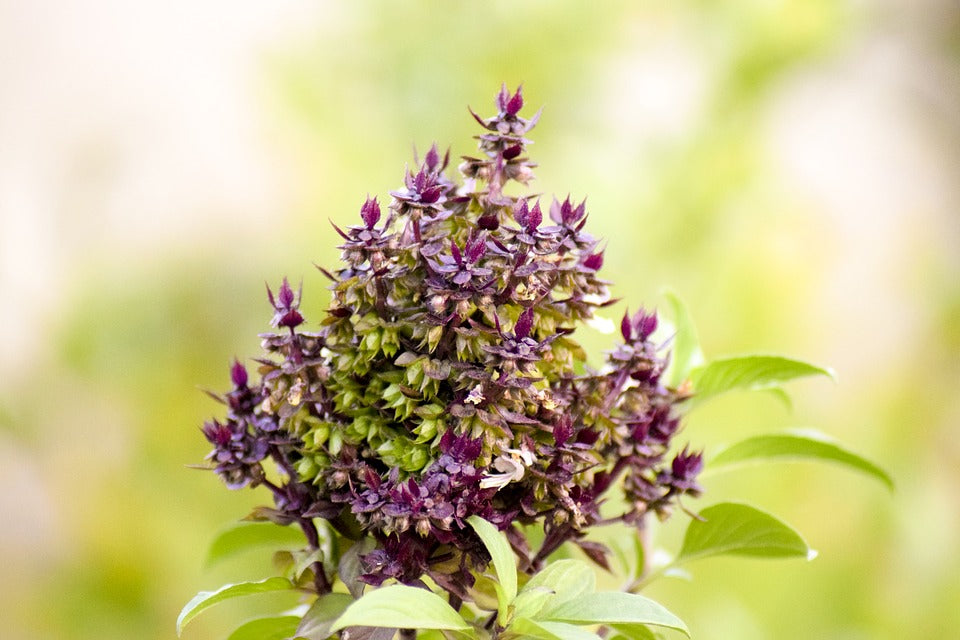Research: The Anti-Cancer Properties of Tulsi Tea (Holy Basil)
Posted by DYLAN LINDEBERG

Disclaimer: Tulsi and its active compounds are currently under investigation for their potential against various cancers. However, the research is in very early stages, and no human trials have been conducted thus far.
Tulsi is currently being studied for its potential usefulness against skin cancer, lung cancer, and breast cancer and potential preventative effects against liver cancer, stomach cancer, and oral cancer [1].
The research we discuss below is still in the animal and cell stages. Future studies will determine whether any of tulsi’s active compounds are useful in cancer therapies. Do not under any circumstances attempt to replace conventional cancer therapy with supplements like tulsi. If you want to use tulsi as a supportive measure, talk to your doctor to avoid any unexpected interactions.
Skin Cancer
In mice, an alcoholic extract of tulsi leaves applied topically was protective against chemically-induced skin cancer [2].
Pre-treatment with an alcoholic extract of tulsi leaves decreased the number of tumors induced by a range of skin carcinogens in a mouse model of skin cancer [3].
In another study, a water-alcohol extract of tulsi reduced tumor size and increased survival rates of mice with melanoma [4].
Tulsi seed oil was also protective against the development of skin cancer and improved survival rates of mice with tumors [5].
Lung Cancer
In a review study, a tulsi alcohol extract induced cell death in human lung cancer cells and suppressed the growth of lung cancer cells in mice [6].
In mice, tulsi extracts reduced MMP9 activity, thus reducing the formation of tumors when tumor cells were injected into the animals [7].
Tulsi extract reduced the formation of tumors in mice injected with lung cancer cells [8].
Phytochemicals contained in tulsi, including carnosic acid, rosmarinic acid, and luteolin are able to inhibit the growth of lung cancer [9].
Breast Cancer
Cell studies have shown that tulsi leaf extract prevented the spread of breast cancer and prevented an increase in the levels of COX–2/inflammation [10].
In cell-based studies, Eugenol (a primary constituent of Tulsi), luteolin, and apigenin killed human breast cancer cells [R,11].
Carnosic acid and rosmarinic acid were shown to inhibit the growth of human breast cancer cells [12].
Prostate Cancer
Studies show that O. sanctum as a single agent and in synergistic combination with docetaxel is beneficial in the treatment of prostate cancer. Docetaxel (DTL), the approved drug for the treatment of metastatic androgen independent prostate cancer, has been shown to improve survival and quality of life in patients. However, the dose limiting adverse effect of DTL is febrile neutropenia and anemia. Research indicates that vicenin-2 and DTL co-administration results in greater decrease in the levels of proliferation marker, Ki67 and angiogenic marker-CD31, while increasing the tumor suppressor E-cadherin expression to a greater extent than either of the agents alone. [29]
Critical signaling proteins like pIGF-1R, which is important for androgen-independent prostate cancer survival and progression, and pAkt, proliferating cell nuclear antigen (PCNA), cyclin D1, fibronectinwere have also been shown to be significantly inhibited by co-administration of vicenin-2 and DTL. [30]
Liver Cancer
Tulsi (leaf alcohol extract) protected liver cells from DNA damage and increased antioxidant levels in response to cancer-causing chemicals and drug exposures [13].
In rats, tulsi significantly prevented chemical-induced liver cancer [14].
Ursolic acid, which is found in tulsi, prevented toxin–induced liver cancer in rats by decreasing oxidative stress [15].
Additional anti-cancer effects were also observed in liver cells from the tulsi phytochemicals apigenin, luteolin, carnosic acid, and rosmarinic acid [16].
Studies have also shown that myrtenal, a monoterpene present in tulsi, was effective in preventing toxin-induced liver cancer in rats [17, 18].
Stomach Cancer
Studies have shown that including tulsi leaves in the diet prevented chemically–induced stomach cancer in mice [19].
An alcohol-based 70% tulsi leaf extract reduced chemical–induced stomach cancer in rats [20].
In an animal study (rats), tulsi selectively induced cell death in chemical-induced stomach cancer, but not in the normal stomach tissue [21].
Eugenol was effective against chemically-induced stomach tumors in mice [22) and in rats [23, 24].
Cell culture studies have shown that phytochemicals in tulsi, luteolin, β-sitosterol, ursolic acid, and apigenin also inhibit growth and kill stomach cancers [25].
Oral Cancer
In a study of 41 patients in India (aged 17 – 56 years), tulsi combined with turmeric was shown to be highly potent against Oral Submucous Fibrosis (OSMF), which if not treated, can progress to oral cancer [26].
In hamsters, water extract of tulsi taken by mouth had the greatest anticancer activity against papillomas and squamous cell carcinomas [27].
In a cell study, tulsi water extract was shown to be highly effective against oral cancer cells [28].
Conclusion
Tulsi has man health benefits, new research is strengthening our conclusions about the benefits of Tulsi tea on our bodies. Try some Tulsi tea today and see for yourself!
BROWSE TULSI TEA
FDA Compliance
The information on this website has not been evaluated by the Food & Drug Administration or any other medical body. We do not aim to diagnose, treat, cure or prevent any illness or disease. Information is shared for educational purposes only. You must consult your doctor before acting on any content on this website, especially if you are pregnant, nursing, taking medication, or have a medical condition.



Wendy On
I am very highly interested in where I can get this and how much is it! I am a breast cancer patient and I want to try this. I am taking turmeric as directed by my oncologist. Thank you for your time
SANJEEV Gupta On
It’s really informative,and give strength to my beleif to treat cancer with the help of different Tulsi parts of whole plant ,alongwith our ancient knowledge,and our latest researchers efforts.
Thanks and best regards.
Sanjeev Gupta.
9891136036.